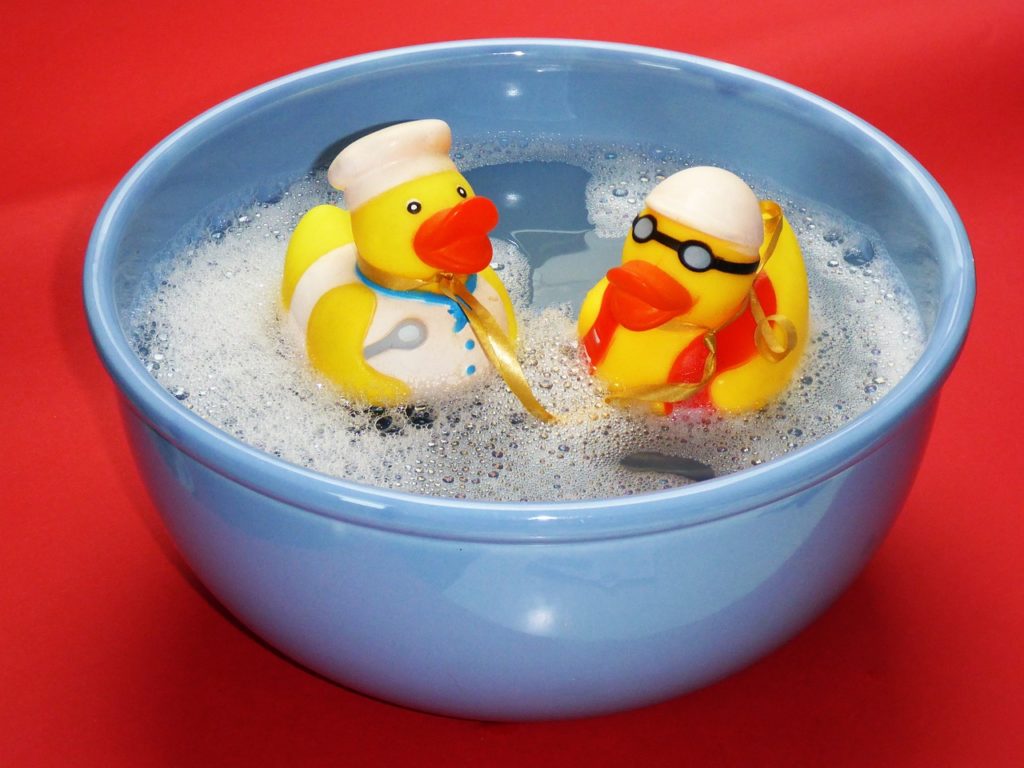
It’s Bath Time!
For many of us, when we were kids, those words meant fun time! Bubbles, plastic toys, pretending to go scuba diving in the bathtub. The fact that we were supposed to be getting clean in the process was really just a side benefit.
Caregivers often have to face bath time in quite a different manner. Instead of handling a slippery little kid, we may have the dead weight of an adult loved one or the uncooperative and combative reactions of a senior who no longer sees any need for a bath. But bathing is an important part of overall hygiene and provides much needed benefit to the skin and hair of the person for whom we are provide care.
If the care recipient is mobile enough to walk into the bathing area (and a senior’s home needs to be modified to allow for a tub-less enclosure) and sit on a chair designed for use in a bathing area, much of the caregiver’s work is done. Someone who needs physical handling to enable them to access a bathing area may be looking at the need for the caregiver to provide a hands-on bath or even a bed bath. And this is where many caregivers, especially those caring for their parents, find a lot of difficulty.
When providing hands on bathing, it is very important to develop techniques that allow you to do the job properly and still maintain as much personal dignity for the care recipient as possible. Here are some steps in handling a bath situation.
Directions
1. Prepare your loved one for bathing by removing the top clothing (blouse, shirt etc.) first and then slipping on a lightweight dressing gown. Close the front of the gown and remove the rest of the clothing. Be sure you don’t wait long before starting the bath – your loved one will get cold quickly in just a light gown.
2. Prepare the water to a slightly more than lukewarm temperature. Aging skin is much more sensitive than yours.
3. Use a bathing glove or soft wash cloth. A liquid body soap is easier to use than bar soap. Begin with one body area at a time.
4. If modesty is really critical – leave the gown on and remove one arm from the gown and expose that side of the chest. Wash from the neck down to waist – front and back and rinse. Reverse the process and do the other side.
5. Lift the gown to expose the lower portion of the body and bath from the feet upward saving the genital area for last. Don’t rinse yet.
6. When washing the genitals, be matter of fact about it and thorough. If washing a male and an erection occurs, simply complete washing without comment or noticeable reaction. Rinse well and place a towel over the genital area or close the dressing gown.
7. Gently wash the face and rinse with a wet cloth instead of shower spray or poured water.
8. If a shampoo is needed – it is usually best to do this at a separate time, using a sink.
9. If you have used a dressing gown, remove it and replace it with an oversize towel that can provide some level of covering. Dry the entire body off well using the same approach of uncovering only the areas that you need to work on and then re-covering them.
10. Use a light powder on a cloth to finish the job off.
For Caregivers
Now, how do you deal with yourself in all this? Very frankly. Bathing is a required part of caregiving. When the time comes that just helping your loved one navigate to the bath or standing by to help if needed is no longer enough, you will have to take care of the task directly. The first few times will be awkward – after all, this may be the person who bathed you as a baby and raised you and was your strength for many years. You will have to consciously set aside your feelings of and help your loved one with their own. This is not easy for them. Losing the ability to provide personal care for yourself is tough.
Loved ones with Alzheimer’s Disease or dementia may present an even more difficult task. Their reactions may range from real fear of being bathed or touched to sexual responses. And these reactions may be especially hard for you to handle. If you are unable to separate yourself from your reactions, it may be time for you to use a bathing service. These services can be arranged at adult day centers, some hospitals provide in home bathing services and most caregiver providers capable helpers for this.
Here is another great article on this topic

